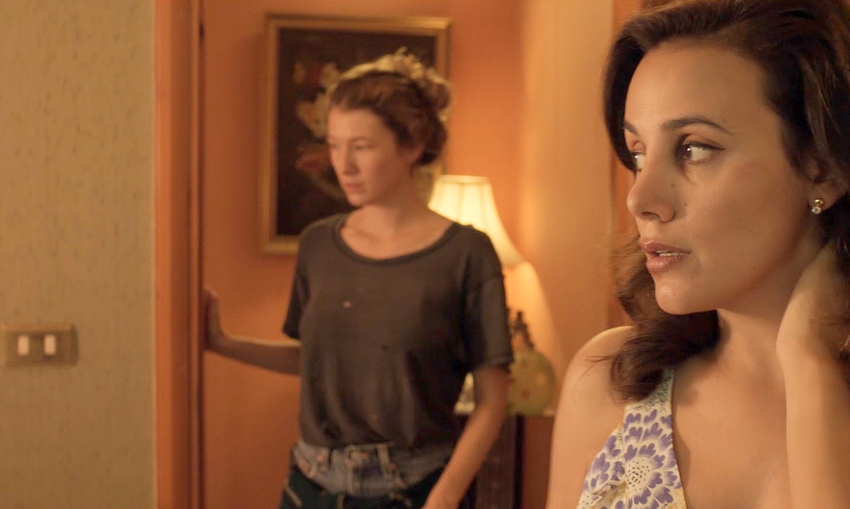
indieactivity: Introduce your film briefly (the name of the film, premise, tone, style and the festival circuit)
Noor Gharzeddine: Are You Glad I’m Here is a film about the unlikely friendship between Kirsten, a young American working in Beirut, and Nadine, the Lebanese housewife who lives next door to her. Tensions rise as Kirsten becomes increasingly involved in Nadine’s world- until one night they find themselves accidental partners in crime.
Although it explores some heavy topics the film is stylistically playful. It’s a genre blend and has elements of drama, comedy, adventure, thriller, and could even be considered a “buddy film.” We tried let reality and the characters drive the story rather than craft a narrative that fits within a certain genre.
Are You Glad I’m Here premiered in April at the Atlanta Film Festival and then went on to Riverrun International Film Festival. Last month we won the audience award and the award for best original score at the Brooklyn Film Festival, and on August 3rd you can catch us at Woods Hole Film Festival!
indieactivity: Give a background of your personal experience with the story, writing, production and marketing
Noor Gharzeddine: As an indie filmmaker I’ve had to wear many hats in order to get this film made and seen! I developed the story alongside our screenwriter, Samuel Anderson. We both wanted to make a film in Lebanon, where my family is from and where he’d studied Arabic. I think starting this project as a team is what allowed us to make it happen at such a young age.
Are You Glad I’m Here, official teaser trailer from Noor Gharzeddine on Vimeo.
In addition to directing I’ve played a producer role throughout. In terms of both marketing and production it’s really about learning the tricks of the trade as you go and trying to learn from other filmmakers who have just gone through the same process. Find a filmmaker who’s doing something you find interesting and buy them a coffee while you pick their brain!
Unless you have tons of money you need to be constantly anticipating the next hurdle and pre-emptively trying to solve problems before they become problems. I was working in production before I took on this project so I luckily had some experience in that type of problem solving.
indieactivity: Did you start writing with a cast (You or any) in mind?
Noor Gharzeddine: Sam and I didn’t have anyone in mind when we began developing the story. I think actually getting the film made seemed like such a far-off fantasy that we didn’t really let ourselves think about it until we were in Lebanon with a casting director!
Most of our cast is Lebanese and we didn’t know too many Lebanese actors- so it was more of a discovery process versus trying to secure specific names. But that was honestly one of the best parts! We held a month of auditions in Lebanon and I got to meet so many amazing actors.
The one American role was that of Kristen, and I did have Tess Harrison in mind, as we’d worked together on a previous project. I’m so glad we were able to arrange having her come over from LA, which I wasn’t originally sure was possible. I think she got to relate to her character in an interesting way, as they were both living out the same experience of being an American coming to Lebanon for the first time!
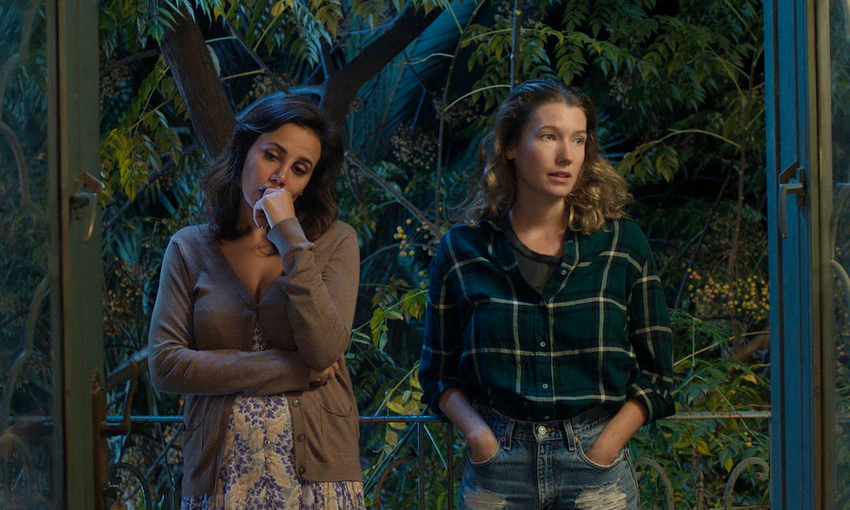
indieactivity: How long did you take to complete the script? (Do you have a writing process?)
Noor Gharzeddine: Sam wrote the script and it took him a few months to do the first draft. Once he had a draft he shared it with me we went through around forty drafts over the course of a year- I’d give him notes and he’d make edits and we’d talk about it and that went on and on. We were probably still editing while shooting, as he was on set with us the whole time.
indieactivity: How did you develop ‘your film’?
Noor Gharzeddine: I thought a lot about the characters and the visual tone of the film. I like to make lots of visual treatments because I think a script can only convey so much, and I think with a genre blending film like this you can’t always sense what the film will feel like from just reading the script. As a director I think a lot about what is not said.
I make visual treatments for the mood, the shots, the characters, their wardrobes, their living environments. In this case we had a distinct part one and part two so those were also divided into different visual treatments. I think about music and mini scenes that don’t necessarily make it into the film but that encompass a mood I want to keep in mind. I really like to talk to the actors and rehearse as much as possible.
indieactivity: How was it financed?
Noor Gharzeddine: We used a mixture of private donors and crowd funding. The film was also written with the intention of being very low budget- for example we included location that we knew we could access for free in Lebanon, asked my family members to be extras, and took advantage of whatever discounts we could.
indieactivity: Is there anything about the independent filmmaking business you still struggle with?
Noor Gharzeddine: Of course! There are no real guidelines on how to get your film made, seen and sold. So much of it is just doing it, meeting the right people at the right time, learning from mistakes and figuring out the best way to do it next time.
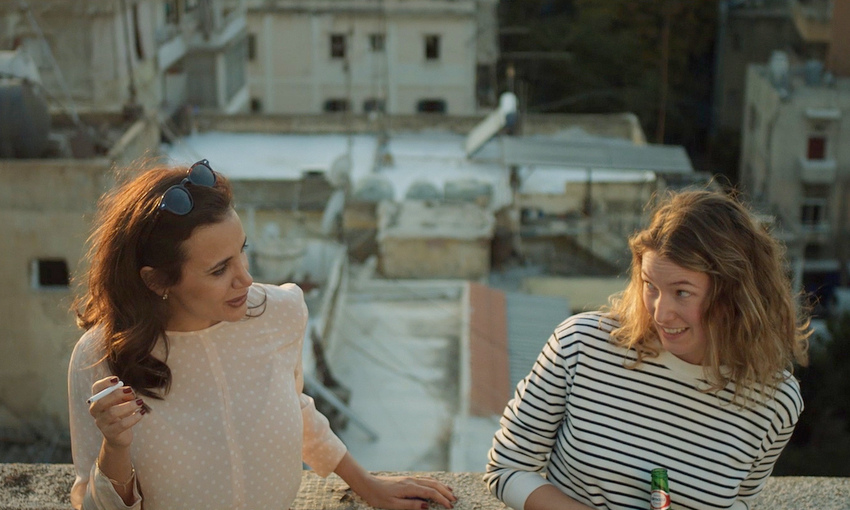
indieactivity: How long was your pre-production?
Noor Gharzeddine: As Sam and I were editing the script I was also trying to remotely begin pre-production in Lebanon from New York. I was trying to find a line producer and casting director so that once we go to Lebanon we’d have a place to start, but that didn’t really work out as I’d planned.
We had to basically just show up in order to get the ball rolling. So, although I personally was in pre-production during that whole year before we shot, we technically had around a month or so of actual pre-production with our whole team and cast.
indieactivity: What was your rehearsal process and period?
Noor Gharzeddine: We had around a month of rehearsals and it was a really great experience for me and the two leads, Marwa Khalil (Nadine) and Tess Harrison (Kirsten). We’d all get together at my apartment and just talk about the script and word choice and start blocking.
Tess and Marwa got to know each other and it was the perfect way to generate some hilarious improve. I always love to rehearse because it gives you time to play without all the pressure of being on set.
indieactivity: You shot the film in days. How long were your days?
Noor Gharzeddine: We shot everything in 18 days and we had 12 hour days, although we often went over.
Q: Did the tight shooting schedule make it harder or easier? How did it affect performances?
A: It was rough! I don’t think it affected performances as much as it limited the amount of coverage we were able to get of each scene and character.
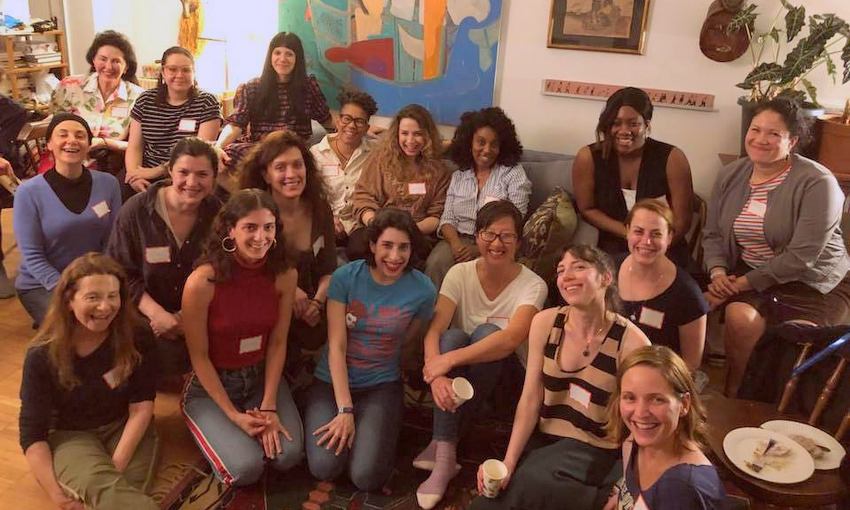
indieactivity: How much did you go over budget? How did you manage it?
Noor Gharzeddine: You always know you’ll go over budget and there are always sneaky costs you need to plan for! It’s helpful to ask other filmmakers what overages they didn’t expect so you can better plan your budget.
Educate yourself on deliverables and make sure your post house is transparent with you about all of that stuff! Something helpful that we did was save our crowdfunding campaign for later in the process so that we had a new source of funds a little later in the game.
indieactivity: How important is marketing? Do you think a project can make any dent without it these days?
Noor Gharzeddine: In the end a film needs an audience and marketing allows you to find your audience and create excitement. There’s so much content out there and marketing your film helps direct the right eyes towards it.
I think it’s important but it doesn’t have to be something you spend tons of money on and can be something you do alongside all the other stages of filmmaking. It will also help you create an audience which is helpful when you start crowdfunding or selling tickets! It’s all interrelated and necessary.
indieactivity: What was the experience like of working with such a small shooting crew?
Noor Gharzeddine: Well, it’s the biggest crew I’ve ever worked with as a director, so it was really exciting for me. I love managing a set, it really feels second nature. I had a great line producer and AD, so I couldn’t complain about anything except for the lack of hours in a day! Lebanon is a small country with a tight knit film community and most of our cast and crew knew each other; having that comradery on set was great for me as a director.
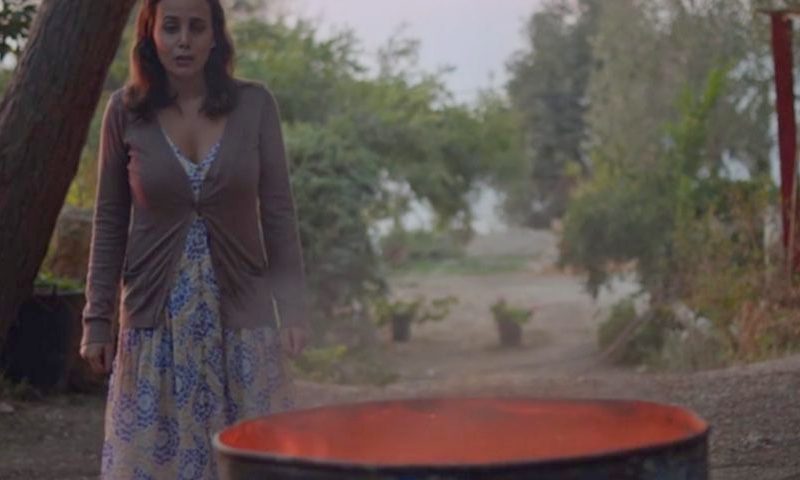
indieactivity: The film looks stunning. How did you get such a good look when shooting so fast?
Noor Gharzeddine: Zaid Chahoud, our amazing DP, and I, met several times and discussed every shot before arriving on set. I also had been thinking about the look of the film during the year leading up to shooting, so I think between Zaid’s experience and my preparation we made the time constraints work.
indieactivity: Did you look at rushes? On what format?
Noor Gharzeddine: I was watching the monitor on set and if I felt unsure about moving on from a certain scene we’d all crowd around DIT and watch rushes. Some nights I’d watch things if I felt unsure about how certain shots would edit together.
But in reality, we were moving so fast and I was so tired I didn’t spend too much time with the hard drives until we’d wrapped! I think that’s a bit unusual but between the rehearsal and my faith in Zaid I didn’t feel that obsessive need to go home every night and look at the day’s work- I was thinking about the next day.
indieactivity: What were the advantages and disadvantages in the way you worked?
Noor Gharzeddine: When you’re 23 and you’re starting your first feature it’s easy to make mistakes. I can name a million things I’d now do differently as an experienced 26-year-old. But I also wouldn’t have had that experience had I not just done it! I think it’s important to find the right balance between rushing things and moving forward.
Getting a film off the ground takes a while and it’s important not to rush things, because it might just slow you down in the long run. Of course, the small budget and limited shooting days feel like a disadvantage, but no one was going to give me a million dollars! However, now that I’ve successfully made one feature, perhaps they will…
I think I had the advantage of my instinct when it came to choosing who to work with; I’m a good leader and I know how to get the best out of people. I have a strong production background and knew how to get the ball rolling before we found a line producer to take over.
indieactivity: What else have you got in the works?
Noor Gharzeddine: I’m still acting as a producer on Are You Glad I’m Here, and I’m loving the festival circuit. I’m also writing my next feature and have written a few shorts.
Follow Noor Gharzeddine on Social Media
Website
IMDb
Facebook
Instagram
Vimeo
Richard Green Documentary, ‘I Know Catherine, The Log Lady’: Premiere in NYC, LA May 9th
Lynchian Doc I Know Catherine, The Log Lady Makes Hollywood Premiere 4/17, Rollout to Follow
In Camera by Naqqash Khlalid Launch on VOD April 29
Naqqash Khlalid’s Directs Nabhan Rizwan. In Camera stars an EE BAFTA Rising Star Award Nominee.
2025 Philip K. Dick Sci-Fi Film Festival Award Winners Announced
Vanessa Ly’s Memories of the Future Awarded Best PKD Feature
Dreaming of You by Jack McCafferty Debuts VOD & DVD for April Release
Freestyle Acquires “Dreaming of You” for April 15th Release
Hello Stranger by Paul Raschid set for London Games Festival & BIFFF
The film Is set for an April 10th Premiere at The Genesis Cinema in London (LGF) and BIFFF
Daydreamers Official Trailer by Timothy Linh Bui: Released by Dark Star Pictures
Daydreamers Vietnamese Vampire Thriller – May 2nd release









